Most people don’t think about their kidneys until something goes wrong. But by then, it’s often too late. Your kidneys filter about 120 to 150 quarts of blood every day, removing waste and extra fluid. If they start to fail, you might not feel it-until you’ve lost half their function. That’s why kidney function tests matter. They’re simple, quick, and can catch problems before you even notice symptoms.
What Do Kidney Function Tests Actually Measure?
There are three main tests doctors use to check how well your kidneys are working: creatinine in your blood, your estimated GFR, and urinalysis. Each one tells a different part of the story.
Serum creatinine is a waste product from your muscles. When your kidneys are healthy, they flush it out through urine. When they’re struggling, creatinine builds up in your blood. But here’s the catch: creatinine doesn’t rise until you’ve already lost about half your kidney function. That’s why it’s not a good early warning sign on its own.
Estimated Glomerular Filtration Rate (eGFR) is the number doctors rely on most. It’s not directly measured-it’s calculated using your creatinine level, age, sex, and sometimes race. The result tells you how well your kidneys are filtering blood. A normal eGFR is 90 or higher. If it drops below 60 for three months or more, it’s a sign of chronic kidney disease. The UK Kidney Association uses the CKD-EPI formula, which is more accurate than older methods, especially for people with higher kidney function.
Urinalysis looks at what’s in your urine. The most important part is checking for albumin-a type of protein that shouldn’t be there. Healthy kidneys keep protein in your blood. If it’s leaking into your urine, it’s one of the earliest signs of damage. The test used today isn’t a dipstick (those are outdated). Instead, labs measure the Albumin-to-Creatinine Ratio (ACR). A result over 70 mg/mmol is considered high. If it’s between 3 and 70, your doctor will ask you to repeat the test. One high result could be from dehydration or infection. Two or three high results over weeks confirm kidney damage.
Why You Can’t Rely on Just One Test
Many people think if their creatinine is normal, their kidneys are fine. That’s dangerous thinking. I’ve seen patients with normal creatinine but high ACR-clear signs of early kidney damage. Why? Because creatinine is a lagging indicator. It only rises after significant damage has happened. Albumin in the urine, on the other hand, shows up early.
Think of it like a car’s check engine light. Creatinine is the light that comes on after the engine is already overheating. ACR is the warning beep you hear before it gets that bad. You need both.
That’s why the UK Kidney Association and the American Kidney Fund both say: Always test both eGFR and ACR together. One without the other is like checking only the oil level in your car and ignoring the brake fluid. You might miss something critical.
Who Should Be Tested and How Often?
You don’t need to get tested unless you’re at risk. But if you fall into any of these groups, you should be checked at least once a year:
- People with diabetes (type 1 or type 2)
- People with high blood pressure
- Those with heart disease or a history of heart attack
- People who’ve had acute kidney injury in the past
- Anyone with a family history of kidney failure
- People over 60
The CDC recommends a basic metabolic panel-including creatinine and eGFR-as part of your yearly checkup. If you’re in a high-risk group, your doctor should also order a urine ACR test every year. Some people with early kidney disease may need testing every 3 to 6 months to track changes.
And don’t assume you’re safe just because you feel fine. Kidney disease doesn’t cause pain. It doesn’t make you tired until it’s advanced. That’s why testing is so important.
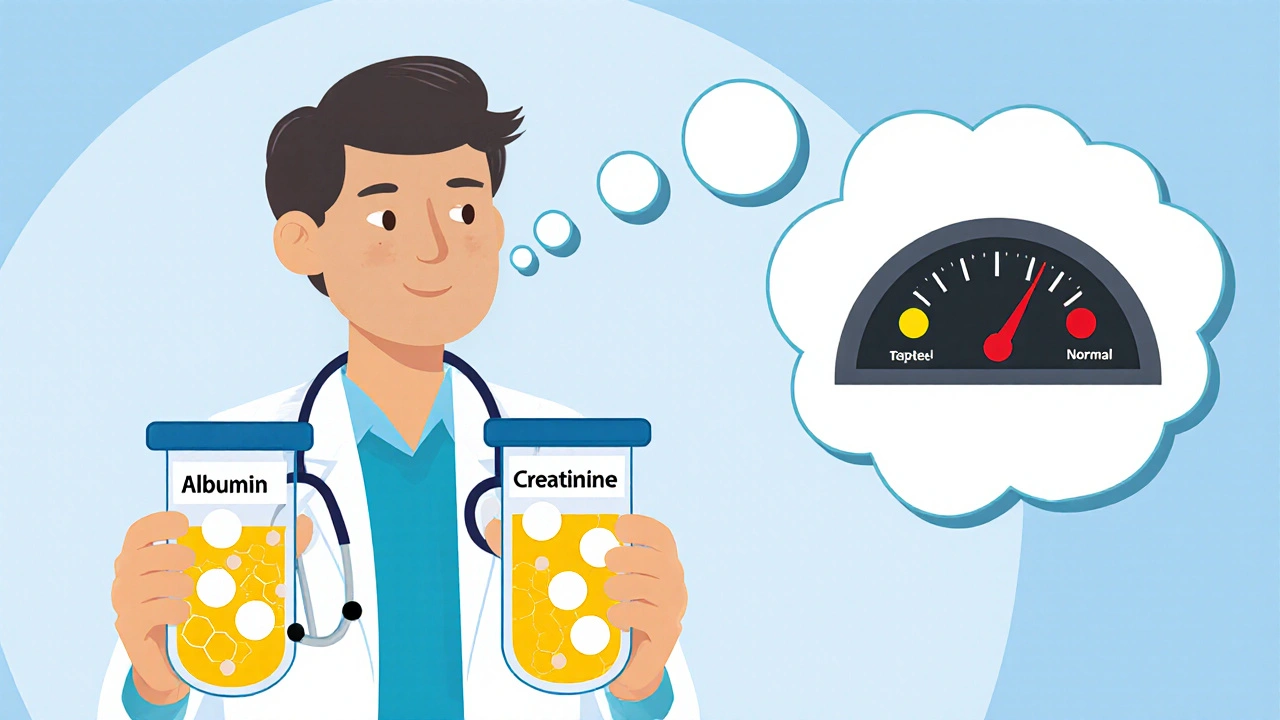
What If Your Results Are Abnormal?
If your eGFR is below 60 or your ACR is high, don’t panic. A single abnormal result doesn’t mean you have kidney disease. Doctors look for patterns. If your numbers stay abnormal over three months, that’s when a diagnosis of chronic kidney disease is made.
What happens next depends on how bad it is:
- eGFR 60-89 with high ACR: Early kidney damage. Focus on controlling blood pressure, blood sugar, and diet.
- eGFR 30-59: Moderate decline. You’ll likely be referred to a kidney specialist (nephrologist). Medications like ACE inhibitors or SGLT2 inhibitors may be started.
- eGFR 15-29: Severe decline. Planning for dialysis or transplant may begin.
- eGFR below 15: Kidney failure. Dialysis or transplant is needed.
For urine results:
- ACR 3-70 mg/mmol: Borderline. Repeat test in 3 months.
- ACR above 70 mg/mmol: Confirmed proteinuria. Needs medical evaluation and treatment.
Many people with early kidney disease can slow or even stop the damage with lifestyle changes and medication. The key is catching it early.
When Creatinine Isn’t Enough: Cystatin C
There are cases where creatinine-based eGFR doesn’t give the full picture. For example:
- If you’re very muscular-more muscle means more creatinine, which can make your eGFR look worse than it is.
- If you’re very underweight or elderly-less muscle means less creatinine, which can hide kidney problems.
- If you’re pregnant-hormones change how creatinine is processed.
- If you’re under 18-standard equations aren’t designed for children.
In these cases, doctors may order a cystatin C test. It’s a protein made by all your cells, and your kidneys filter it out. It’s not affected by muscle mass, diet, or age the way creatinine is. Some hospitals now use cystatin C to calculate a second eGFR to cross-check the creatinine-based one. If both match, you can trust the result. If they’re very different, your doctor knows to dig deeper.
What About 24-Hour Urine Tests?
You might hear about collecting urine for 24 hours. That test measures total protein, sodium, potassium, and other substances. It’s accurate-but it’s a hassle. You have to collect every drop of urine for a full day. It’s messy, easy to mess up, and rarely needed anymore.
Today, ACR is the gold standard for checking protein in urine. It’s just as accurate, much easier, and done with a single morning sample. Unless your doctor suspects a rare kidney disorder, you probably won’t need a 24-hour collection.
What You Can Do Now
You don’t have to wait for symptoms. If you’re over 40, or have diabetes, high blood pressure, or a family history of kidney disease, ask your GP for a simple blood and urine test. It’s covered by the NHS. No appointment needed in many cases-you can just walk into your local clinic.
And if your results are normal? Keep getting checked. Kidney disease creeps up slowly. One test every year is enough for most people. But if you’re high risk, don’t skip it.
Don’t ignore your kidneys. They’re silent workers. But when they fail, they take your whole body down with them. Catching problems early isn’t just smart-it’s life-saving.
What is a normal creatinine level?
Normal creatinine levels vary by age, sex, and muscle mass. For adult men, it’s usually 0.7 to 1.3 mg/dL. For adult women, it’s 0.6 to 1.1 mg/dL. But these numbers alone don’t tell you if your kidneys are healthy. That’s why doctors use eGFR, which adjusts for your age and sex. A normal creatinine with a low eGFR can still mean kidney damage.
Can I check my kidney function at home?
There are no reliable home tests for kidney function. Urine dipstick strips sold online aren’t accurate enough for detecting early kidney damage. The only way to get a proper eGFR and ACR is through a lab test ordered by your doctor. Even if you feel fine, don’t skip professional testing if you’re at risk.
Does drinking more water improve kidney function?
Drinking water helps your kidneys work better by keeping them hydrated, but it won’t fix damage. If you have chronic kidney disease, forcing extra fluids won’t raise your eGFR. In fact, too much water can be harmful in advanced stages. The goal isn’t to drink more-it’s to avoid dehydration and control blood pressure and sugar.
Why does my doctor check my blood pressure when I’m getting kidney tests?
High blood pressure is the second leading cause of kidney failure after diabetes. It damages the tiny filters in your kidneys. That’s why doctors check both. If your blood pressure is high and your ACR is elevated, treating the pressure can slow or even stop kidney damage. Controlling it is often the most effective step you can take.
Can kidney damage be reversed?
Early kidney damage can sometimes be slowed or even partially reversed-especially if it’s caused by uncontrolled diabetes or high blood pressure. Medications like ACE inhibitors, SGLT2 inhibitors, and lifestyle changes (low salt, no smoking, healthy weight) can help. But once scar tissue forms, it’s permanent. That’s why early testing is so important. Catch it early, and you can protect what’s left.


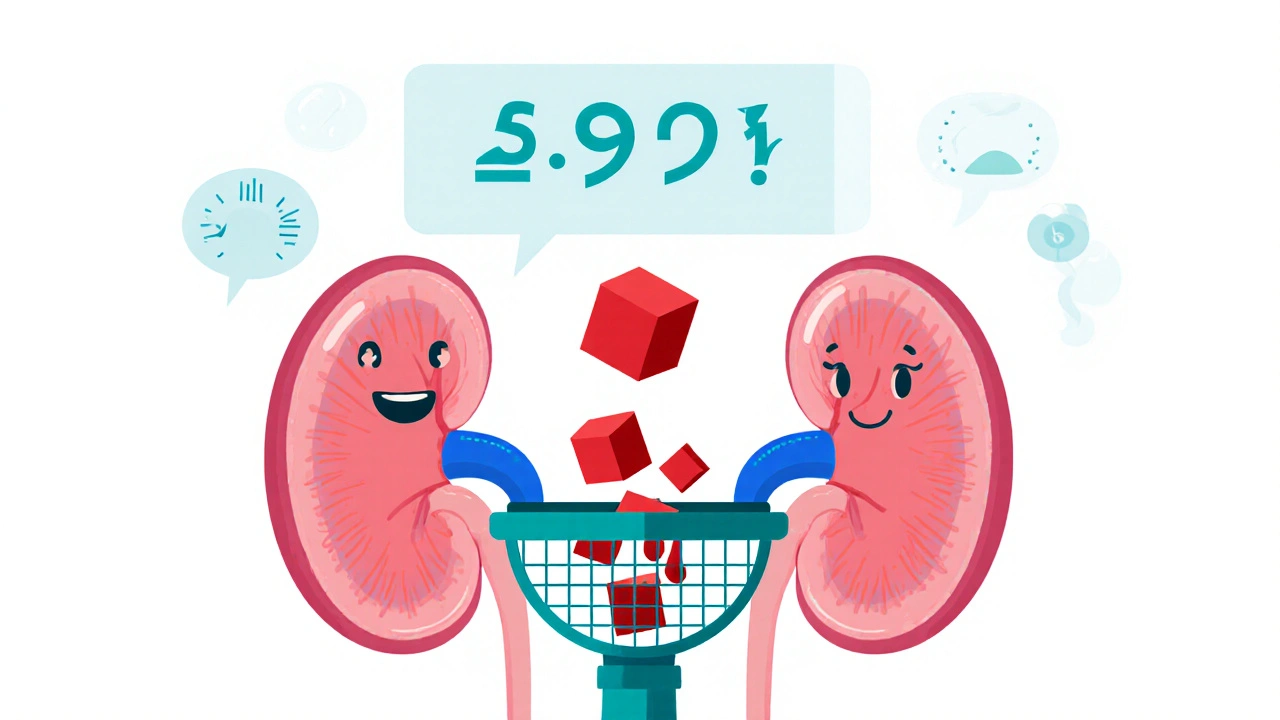
 Medications
Medications
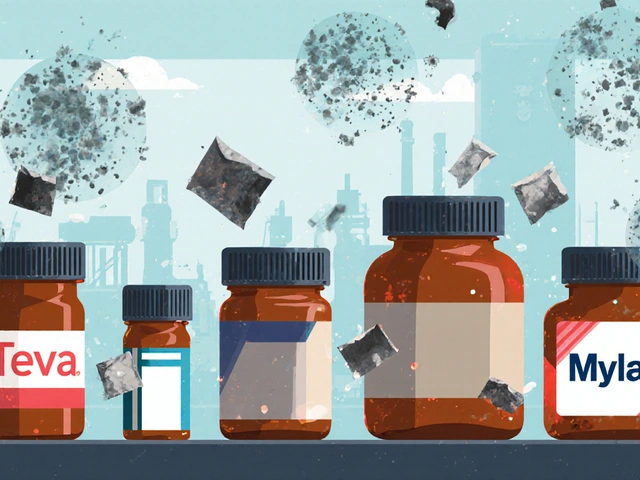


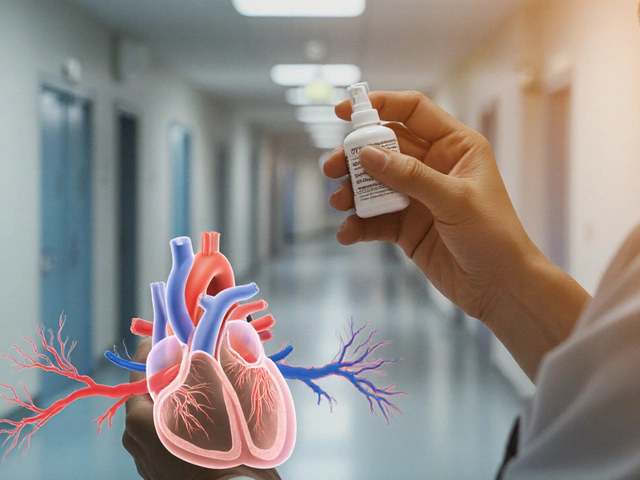
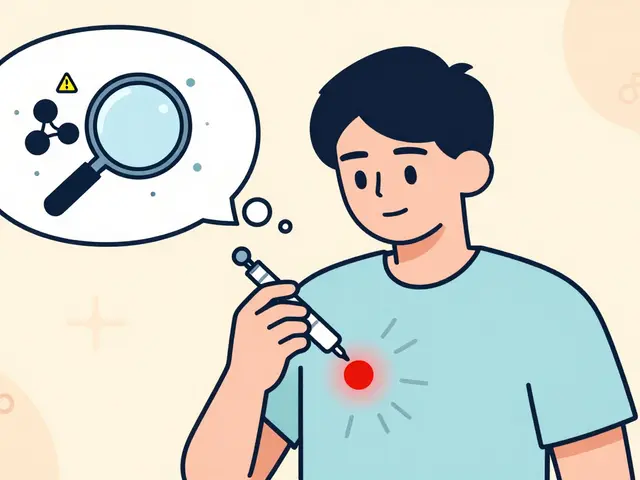
Matthew Peters
November 19, 2025 AT 04:58Man, I never realized how much my kidneys were doing until I read this. I thought if I wasn't peeing funny or feeling back pain, I was fine. Turns out my kidneys have been working overtime while I was eating burritos at 2am. Thanks for the wake-up call.
Liam Strachan
November 20, 2025 AT 03:07Really well explained. I’ve been getting my ACR checked annually since my dad had kidney issues. It’s scary how silent it is until it’s not. Glad the NHS covers it-should be standard for everyone over 40.
Gerald Cheruiyot
November 20, 2025 AT 07:24Its funny how we ignore the organs we dont feel
Its like air
You only notice when its gone
My dad had a stroke from undiagnosed hypertension
Now I check my numbers every year
No drama
No panic
Just data
Michael Fessler
November 22, 2025 AT 04:04Just want to clarify something-eGFR calculated via CKD-EPI is superior to MDRD, especially in higher GFR ranges. Also, cystatin C-based eGFR has better precision in elderly populations and those with low muscle mass. If your lab offers it, request it. It’s not routine yet, but it should be. Also, ACR >30 mg/g is the ADA threshold, not 70 mg/mmol-double-check your units. 70 mg/mmol is roughly 620 mg/g, which is way off.
daniel lopez
November 23, 2025 AT 06:29They don’t want you to know this-but the pharmaceutical industry pushes these tests because they make billions off kidney meds. The real cause? Glyphosate in your food and water. The FDA doesn’t test for it. Your doctor won’t tell you. But if you’re eating processed food, you’re slowly poisoning your kidneys. Go organic. Or don’t. I’m just saying.
Nosipho Mbambo
November 25, 2025 AT 02:55Okay, so… I have high blood pressure, I’m 52, I eat chips every day, and I’ve never been tested…
Wait, I’m supposed to care about this? Why? I feel fine. Can I just… not?
Katie Magnus
November 25, 2025 AT 05:58Ugh. Another ‘trust your doctor’ article. Newsflash: doctors don’t know anything. I’ve been doing keto for 3 years and my creatinine is ‘elevated’-but I have the kidneys of a 25-year-old athlete. This whole system is broken. I don’t need tests. I need intuition.
King Over
November 25, 2025 AT 22:59My cousin had a kidney transplant last year
He was fine until he wasn’t
Now he takes 17 pills a day
Don’t wait
Get tested
It’s free
Just do it
Johannah Lavin
November 26, 2025 AT 11:54This is so important. I’m a nurse and I see so many patients who come in with stage 4 kidney disease and say ‘I didn’t know’. Please, if you’re over 40, diabetic, or hypertensive-don’t wait for symptoms. Your kidneys are silent, but they’re screaming. Get the test. You’ll thank yourself later. 💙
Ravinder Singh
November 27, 2025 AT 06:02Bro, I’m from India and we don’t even have access to ACR tests in rural clinics. But we do have a simple trick: check for swelling in ankles and puffiness around eyes in the morning. That’s early proteinuria. Also, if your urine is foamy for days? Go get tested. No fancy machine needed-just awareness. Keep sharing this info, it saves lives.
Russ Bergeman
November 27, 2025 AT 20:05Wait, so you’re saying I should get a blood test… and a urine test… and then… wait for results… and then… go back? That’s like 3 hours of my life. And for what? To hear ‘maybe you’re fine’? I’d rather just eat my chips and hope for the best.
Dana Oralkhan
November 28, 2025 AT 00:24I love how this post doesn’t just list tests-it explains why they matter. I had a friend who ignored her ACR because her creatinine was ‘normal’. She ended up on dialysis by 45. Please, if you’re reading this and you’re in a high-risk group-don’t be that person. Take 5 minutes. Get tested. It’s not scary. It’s empowering.
Jeremy Samuel
November 28, 2025 AT 03:20Urinalysis? Nah. I just look at my pee. If it’s yellow, I’m good. If it’s clear, I’m hydrated. If it’s brown… well, I’m probably dead already. Why pay for a lab when I’ve got my eyeballs?
Destiny Annamaria
November 28, 2025 AT 16:41Just got my ACR back-34 mg/mmol. My doctor said ‘keep an eye on it’. I feel like I just got a warning text from my mom: ‘you might want to think about this’. I’m gonna start drinking more water. And maybe eat less salt. And maybe not stress so much. And maybe… I should just go for a walk?
Ron and Gill Day
November 29, 2025 AT 10:52This whole article is a scam. Kidneys don’t fail from diet. They fail from government toxins in the water supply. And the ‘eGFR’? That’s just a computer-generated lie. My cousin’s nephrologist admitted to me-90% of these numbers are made up to sell drugs. You’re being manipulated. Wake up.